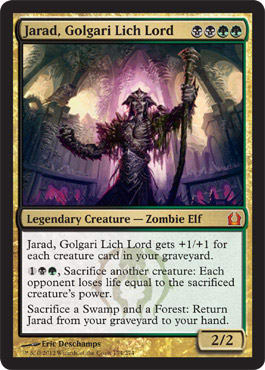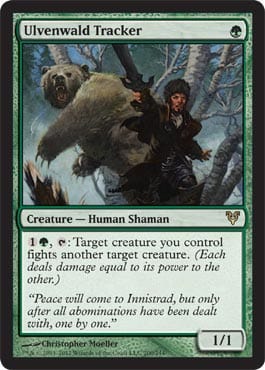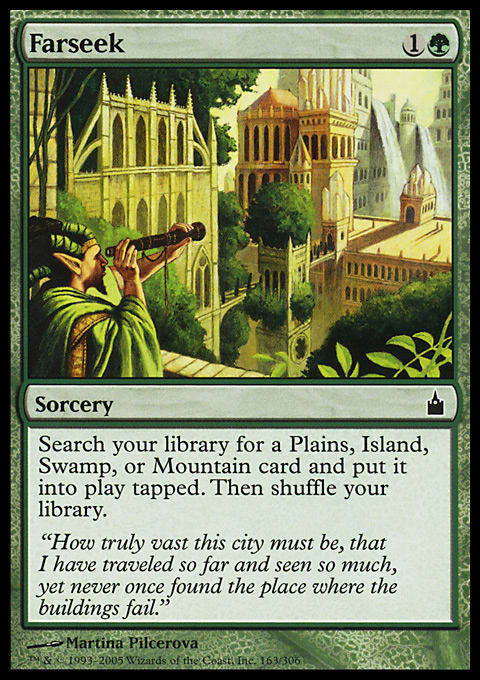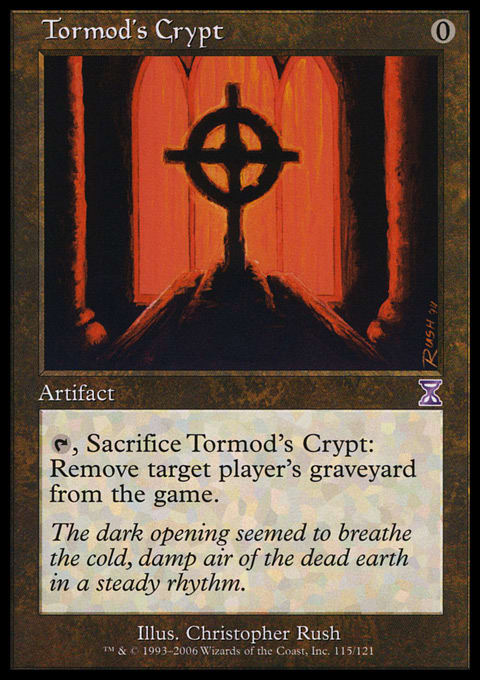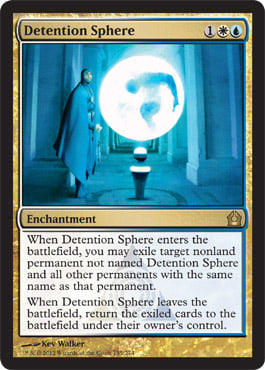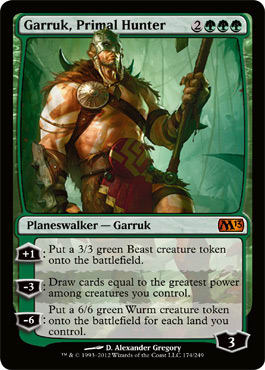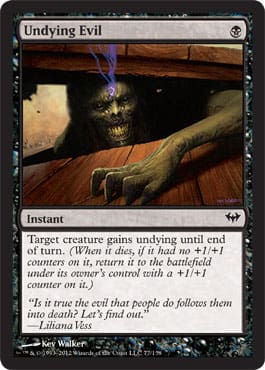Jarad, Golgari Lich Lord is a great build-around card that many players were itching to use when it was first revealed. Although undoubtedly powerful in Commander, it has so far failed to live up to its potential in Standard. Here's the deck I put together to drain your opponent's life total without draining your bank account:
"Golgari Sacrifice"
- Creatures (22)
- 3 Ulvenwald Tracker
- 4 Arbor Elf
- 4 Borderland Ranger
- 4 Desecration Demon
- 4 Wolfir Silverheart
- 3 Jarad, Golgari Lich Lord
- Spells (14)
- 2 Ultimate Price
- 4 Undying Evil
- 4 Farseek
- 4 Rancor
- Lands (24)
- 4 Golgari Guildgate
- 10 Swamp
- 10 Forest
- Sideboard (15)
- 4 Tormod's Crypt
- 2 Ultimate Price
- 2 Sever the Bloodline
- 4 Duress
- 3 Crushing Vines
The Creatures
Jarad, Golgari Lich Lord is the keystone of the deck. With gigantic threats like Wolfir Silverheart and Desecration Demon, it shouldn't be difficult to sacrifice 20 power of creatures over the course of a couple turns. If your opponent has been killing your creatures, you can still beat down with your pumped-up Jarad, and if the opponent kills him as well, you can bring him back from the grave with a pair of extra lands.
Wolfir Silverheart not only gives you an 8-power creature for only 5 mana, it gives a second creature +4/+4 as well. Sacrificing one of these to Jarad will often be the method by which your opponents meet their doom. Since Wolfir Silverheart has the opportunity to pair up whenever a new creature enters the battlefield, you can sacrifice small creatures to Jarad one after another, with each receiving a power boost from tag-teaming with the Wolf.
Desecration Demon provides another high-powered creature to sacrifice as well as an evasive threat that can push in some damage the normal way. While the Demon can often be kept under control if your opponent can sacrifice creatures for a few turns while he or she ends the game, in this deck, that extra power can be used for more than just attacking. Even if your opponent can keep tapping Desecration Demon indefinitely, each +1/+1 counter means another life lost when you sacrifice it to Jarad.
Ulvenwald Tracker is another way to take advantage of the high power of your creatures, picking off your opponent's best threat every turn for only 2 mana. Barring another Silverheart on your opponent's side of the field, almost nothing can handle a fight with the big bad wolf.
Borderland Ranger helps fix your mana to make sure you can cast Jarad and it also ensures that you continue to hit your land drops, allowing you to potentially cast a creature and activate Jarad in the same turn later in the game. It provides an early defense, allowing you to trade with smaller creatures or chump-block larger ones, and it gives you a creature to pair up with Wolfir Silverheart.
Arbor Elf accelerates your mana as early as turn two and provides another body for Wolfir Silverheart to pair with. Although it can only give you green mana unless you have an Overgrown Tomb or two you can throw in the deck, support from other cards such as Farseek and Borderland Ranger should ensure you don't have too much trouble assembling Jarad's restrictive mana cost.
The Spells
Farseek is another way to ramp up your mana production. It only finds you black mana—once again, unless you have access to Overgrown Tomb—but Arbor Elf and Borderland Ranger balance this out fairly well.
Rancor can be used to repeatedly give some extra power to whatever creature is about to be sacrificed to Jarad. It also gives your creatures trample, allowing your giant creatures to deal some damage by attacking as well.
Undying Evil is normally used to thwart removal spells in Limited, but in this deck, it serves a far greater purpose. It lets you sacrifice your Wolfir Silverheart at the end of your opponent's turn to make him lose 8 life, only to have it come right back to the battlefield, ready to be sacrificed for another 9 life on your turn. This card will catch most people off guard, and it will almost assuredly net you some free wins over the course of a tournament.
Ultimate Price is the current 2-mana removal spell, following in the footsteps of cards such as Doom Blade and Go for the Throat. Although somewhat more restrictive than its predecessors, it still does the job most of the time in the current Standard environment, getting rid of threats such as Sublime Archangel, Wolfir Silverheart, and Angel of Serenity.
The Sideboard
The third and fourth copies of Ultimate Price can help you survive against more aggressive decks, against which you need to keep the pressure off early to avoid dying before Jarad can do his thing.
Tormod's Crypt provides a solid foil to reanimator decks while also potentially helping to hamper the Runechanter's Pike decks that have been gaining popularity if you feel that you need an extra way to slow them down. It exiles the entire graveyard, giving you the opportunity to deal with multiple potential problem cards in one shot, and it doesn't require any mana, allowing you to tap out for Lich Lords and Silverhearts as needed.
Sever the Bloodline is devastating against tokens, and it also provides you with a more robust removal spell when you need it, either against decks full of multicolored creatures or decks such as reanimator against which you'd rather not be putting threats back in the graveyard.
Duress helps you disrupt control decks, often by stopping the opponent from being able to disrupt you. You can remove counterspells and removal that might otherwise pose a threat to your game plan, and you can make sure Sphinx's Revelation never sees the light of day.
Crushing Vines is a very solid sideboard card against the W/U decks playing Runechanter's Pike. It destroys not only the Pike, but many of the creatures that wield it as well, such as the ever-present Restoration Angel.
Playtesting
Bant Control – Game 1
I lost the roll and kept a hand of three Swamps, Golgari Guildgate, Desecration Demon, Rancor, and Undying Evil. My opponent played a Hallowed Fountain tapped and passed the turn. I drew Arbor Elf, played my Guildgate, and passed back.
My opponent played a second Hallowed Fountain, again putting it into play tapped and passing the turn. I drew a Forest, played my Swamp, and cast Arbor Elf. I ended my turn.
My opponent played a Forest and cast Farseek, finding a Temple Garden. He then passed the turn. I drew another Arbor Elf, played my Forest, and cast Desecration Demon before passing the turn.
My opponent played a Glacial Fortress and passed back. I drew Jarad, Golgari Lich Lord and cast Rancor on my Desecration Demon. I attacked, and my opponent cast Azorius Charm to put the Demon on top of my library. I played a Swamp, cast another Arbor Elf, and passed the turn.
My opponent paid 2 life to play a Temple Garden untapped, then cast Garruk, Primal Hunter. He activated the +1 ability to make a Beast token and ended his turn. I drew my Desecration Demon, played a Swamp, and cast it. I enchanted it with Rancor again and passed the turn.
My opponent played a Glacial Fortress and cast Jace, Architect of Thought, activating his −2 ability. He revealed Hinterland Harbor, Thragtusk, and Detention Sphere. I put the land with the Thragtusk, and my opponent took the Detention Sphere. He then cast the Sphere, exiling my Demon. He made another Beast with Garruk and ended his turn. I drew Ulvenwald Tracker and cast it along with Jarad, Golgari Lich Lord. I passed the turn.
My opponent activated Jace's −2 again, revealing two lands and a Supreme Verdict. I put the Verdict by itself, and my opponent took it. He cast the Verdict, and I saved Jarad with Undying Evil, bringing him back as a 6/6. My opponent paid 2 life to put a Temple Garden onto the battlefield untapped and cast another Jace, Architect of Thought. He activated the +1 ability on each of his planeswalkers and passed the turn. I drew Desecration Demon, enchanted Jarad with Rancor, and attacked Garruk. Jace's ability shrunk the Lich Lord's power by 1, and the Beast token sacrificed itself to save its master. Garruk took 4 trample damage, dropping to 2 counters. I cast my Demon and ended my turn.
My opponent activated Jace's −2, choosing Farseek and Sunpetal Grove over a Hinterland Harbor. He played the Sunpetal Grove, then cast Farseek and Borderland Ranger, finding a Hallowed Fountain and an Island, respectively. He made another Beast with Garruk and passed the turn. I drew a Forest, played it, and went straight to combat. My opponent sacrificed his Borderland Ranger to tap the Demon and put a +1/+1 counter on it, and Jarad attacked for 8. The Beast token soaked up 3 damage, and my opponent dropped to 11. I passed the turn.
My opponent played a land and cast Supreme Verdict, and I sacrificed my Desecration Demon to drop him to 4. He activated Jace's −2, choosing an Azorius Charm over Borderland Ranger and Sunpetal Grove, made another Beast with Garruk, and ended his turn. I drew Farseek and sacrificed a Forest and Swamp to bring Jarad back from the grave, floating the 2 mana to help me cast him. I cast Farseek, finding a Swamp, and ended my turn.
My opponent played a land, activated the +1 ability on Garruk and Jace, and passed the turn. I drew a Swamp, played it, and ended my turn.
My opponent played a land and activated both +1 abilities again before passing the turn. I drew Wolfir Silverheart and cast it, pairing it with Jarad. I ended my turn.
My opponent used Garruk's ultimate ability for thirteen 6/6 Wurm tokens, then passed back to me. I drew a Swamp, played Rancor on Wolfir Silverheart, and sacrificed it to make my opponent lose 10 life. Unfortunately, he had a Sphinx's Revelation for 10 in response, and I died to a baker's dozen of giant Wurms.
Sideboarding
+4 Duress
Game 2
I kept a hand of two Swamps, a Forest, two Undying Evil, Farseek, and Wolfir Silverheart. I opened with a Forest, and my opponent put a Hallowed Fountain onto the battlefield tapped.
I drew Desecration Demon, played a Swamp, and cast Farseek for another one. I ended my turn. My opponent played a Hinterland Harbor and cast a Farseek of his own, fetching a Temple Garden. He passed the turn.
I drew Rancor, cast my Desecration Demon, and passed the turn. My opponent put a Temple Garden onto the battlefield tapped and passed back.
I drew a Forest and attacked with the Demon. My opponent took 6, and I played the Forest before ending my turn. My opponent played a Glacial Fortress and cast Tamiyo, the Moon Sage. He tapped down my Desecration Demon and passed the turn.
I drew a Swamp, played it, and cast Wolfir Silverheart, pairing it with the Demon and passing back. My opponent tapped down the Silverheart with Tamiyo, then played another Glacial Fortress and ended his turn.
I drew a Borderland Ranger and attacked with the Demon, which was blocked by a flashed-in Restoration Angel. With no untapped creatures to attack with, I skipped combat and cast a Borderland Ranger, searching up a Forest, which I played before passing the turn. My opponent put another counter on his Tamiyo to keep Desecration Demon tapped down, then played a tapped Hallowed Fountain and ended his turn.
I drew Evolving Wilds and attacked, sending Wolfir Silverheart at Tamiyo and Borderland Ranger at my opponent. Each took the damage, with Tamiyo biting the dust and my opponent dropping to 12. I played my Evolving Wilds and ended my turn. My opponent played a Glacial Fortress and cast Thragtusk, going up to 17 life. He ended his turn, and I sacrificed my Evolving Wilds for a Forest.
I drew an Arbor Elf and cast Rancor on my Wolfir Silverheart. My opponent countered it with Dissipate. I moved to combat, and my opponent sacrificed his Thragtusk to tap the Demon. I attacked with my other two creatures, and Thragtusk's token blocked the Silverheart. My opponent took 2 from Borderland Ranger, and I passed the turn. My opponent put a Temple Garden onto the battlefield tapped and passed back.
I drew Sever the Bloodline and attacked with my three creatures. My opponent flashed in Restoration Angel to block the Demon and dropped to 5 from the other creatures. I cast Arbor Elf and ended my turn. My opponent drew his card and conceded.
Game 3
I kept a hand of two Swamps, Golgari Guildgate, Borderland Ranger, Wolfir Silverheart, and two Undying Evil. My opponent played a Hinterland Harbor and passed the turn, and I played a Golgari Guildgate after drawing Rancor and passed back.
He played a Forest and ended his turn, and I drew an Evolving Wilds. I played the Wilds and passed.
My opponent played a Sunpetal Grove and passed the turn, and I sacrificed Evolving Wilds for a Forest during his end step. On my turn, I drew another Rancor, played a Swamp, and cast Borderland Ranger. I searched up a Forest and ended my turn.
My opponent played a Sunpetal Grove and ended his turn. I drew a Forest, played it, and cast Rancor on the Ranger. I attacked for 4, and my opponent put the Ranger on top of my library with Azorius Charm. I passed the turn.
My opponent played a Cavern of Souls naming Wizard and cast Garruk, Primal Hunter. He made a Beast token and ended his turn. I drew my Borderland Ranger, played a Swamp, and cast Wolfir Silverheart. I passed the turn.
My opponent played a tapped Temple Garden, made another Beast, and passed back. I drew Evolving Wilds, played a Forest, and cast Borderland Ranger. I paired it with Wolfir Silverheart and searched up a Swamp. I cast Rancor on the Silverheart and attacked Garruk for 10. My opponent played a Snapcaster Mage and flashed back Azorius Charm, putting the Silverheart on top of my library. I ended my turn.
My opponent played a Hinterland Harbor and cast Tamiyo, the Moon Sage. He tapped down my Borderland Ranger and attacked for 8 with his creatures. He made another Beast token with Garruk and ended his turn. I drew my Silverheart, played a Swamp, and cast it again, pairing it with Borderland Ranger. I then ended my turn.
My opponent tapped down my Wolfir with Tamiyo and attacked me down to 1 life. He used Garruk's ultimate ability to make seven 6/6 Wurm tokens, and I conceded.
Wrap-up
Because of the low threat density in this deck, it's more vulnerable than I would like to non-destructive removal such as Azorius Charm. It can also struggle to close out games without Jarad, especially if your opponent has a fair number of creatures. Undying Evil proved to be more situational than I had anticipated, although it was a blowout when it did work. Going forward, I would look into ways to make the deck's Plan B more solid, perhaps with a few more threats capable of closing out a game. Although this deck definitely has some room for improvement, it's a solid starting point if you've been itching to toy with Jarad in Standard.
As always, if you have any questions or comments, you can find me on the forums under Twinblaze, on Twitter under @Twinblaze2, or simply leave a comment below.













